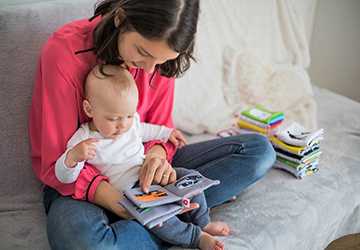When to Start Reading to Your Baby
Presenting your infant to the realm of literature extends beyond mere bonding; it marks a fundamental stride in their cognitive and emotional growth. While the best age to start reading to a baby might seem ambiguous, research suggests it's never too early. In this comprehensive article, you will learn about the perks of reading beneficial books to your infants and how making it a habit can significantly affect your baby's mental growth and learning capacity.
The Best Age to Start
Best Time to Take this Step
Embarking on the exploration of literature can commence as soon as the infancy stage. No doubt some things are done naturally, but making extraordinary efforts can make you brilliant. So is the language acquisition process. You can learn the basics through imitation from your surroundings, but reading books to your infants from an early age can polish their innate ability to learn and grow. Starting from an early age, your baby gradually grasps linguistics and literature skills smoothly and precisely. It becomes the building block of their language learning ability and also develops a good sense of analyzing and observing their surrounding world. It develops their admiration towards books, which is a beneficial habit for them in the long run.

Why Initiate Early?
● Augments auditory abilities
● Expedites linguistic progression
Benefits of Reading to Infants
Engaging with your infant through storytelling offers numerous benefits, surpassing linguistic growth. It fosters a connection between caregiver and infant, offers sensory enrichment, and initiates the foundation for educational and interpersonal triumphs.
● Interpersonal and Emotional Growth: Narratives encompass a range of feelings, cultivating compassion and comprehension.
● Intellectual Advantages: Introducing various vocabulary and ideas aids in intellectual maturation.
● Establishment of Regularity: Storytime can evolve into a treasured segment of your infant’s nightly schedule, indicating that it’s time to relax and unwind.
How to Introduce Reading to Babies
Initiating your newborn into the world of books ought to be a pleasant experience. You can act upon the following strategies that can help you make reading to your babies a daily routine:
● Select Books Suitable for Their Age: Choose books featuring vibrant images, easy-to-understand text, and engaging features such as textures or sounds.
● Interact and Engage: Employ various voices for characters, identify and name objects, and pose queries to stimulate your baby's curiosity.
● Establish a Reading Schedule: Allocate a set time every day for reading, establishing a soothing ritual that your baby will anticipate eagerly.
Making Reading a Daily Habit
Developing a routine of regular reading demands patience and dedication. Below are strategies to effortlessly incorporate reading into your daily schedule for both you and your infant:
● Establish a Fixed Reading Time: Whether it's before naptime or bedtime, maintaining a consistent timetable reinforces reading as a customary practice.
● Engage Every Family Member: Motivate siblings and other relatives to join reading sessions, nurturing a household-wide atmosphere of literary engagement.
● Expand Your Home Library: Accumulate an assortment of books suitable for babies and young children, enabling your little ones to select what captivates them as they develop.
Challenges and Solutions
The perks of reading to your babies seem very convincing for parents, but they sometimes find it challenging to take time out of their busy schedules and make it a habit for these kids. Here are common obstacles and how to overcome them:
Lack of Time: Even a few minutes of reading can be beneficial. Look for opportunities to read throughout the day to read, such as waiting times or quiet moments.
● Keeping Your Baby Engaged: Choose interactive books; feel free to switch books if your baby seems disinterested. Engagement can vary day by day.
● Building a Diverse Library: To diversify your baby's reading material without significant cost, utilize libraries, second-hand bookstores, and book swaps with other parents.
Cultivating a Rich Language Environment
Fostering Linguistic Diversity
Creating a linguistically rich environment goes beyond mere reading; it involves embedding various languages and dialects into your baby's auditory landscape. This exposure can significantly enhance their linguistic flexibility and appreciation for global cultures, aligning with the benefits of reading to infants by exposing them to a wealth of linguistic sounds from the best age to start reading to babies.
Multilingual Books
Incorporating books in different languages can be a fantastic way to introduce reading to babies, allowing them to experience the sounds and rhythms of multiple languages, even if you need to be fluent in them yourself. This method taps into the benefits of reading to infants by fostering early linguistic skills and cultural awareness.
Personalized Storytelling
While published books are invaluable, the art of personalized storytelling offers a unique dimension to your baby's literary journey. Creating stories about your family, your baby's daily experiences, or even imaginative tales about their toys can make the reading experience incredibly special and tailored, perfectly embodying how to introduce reading to babies.

The Art of Choosing Books
Curating a Diverse Bookshelf
The content and themes of the books you choose play a pivotal role in developing your baby’s understanding of the world, illustrating the benefits of reading to infants. Aim to curate a bookshelf that represents a wide array of cultures, perspectives, and stories, which is vital from the best age to start reading to baby.
Books That Grow with Your Child
As your baby grows, their interests and comprehension levels will change. Selecting books that cater to various developmental stages ensures that reading remains a stimulating part of their life, echoing the importance of knowing how to introduce reading to babies effectively.
Engaging the Senses
Beyond the Words: Sensory Books
For infants, books that engage more than just the sense of hearing can be particularly impactful. Books with different textures, smells, or even built-in sound elements can provide a multisensory experience that enriches the reading session; this aligns with the benefits of reading to infants and supports the idea that the best age to start reading to babies is as early as possible.
Conclusion
In conclusion, the best age to start reading to a baby is as early as possible. Reading to infants has extensive benefits, affecting their emotional, social, and cognitive development. Understanding how to introduce reading to babies and making it a daily habit can give your child a strong foundation for their future learning and development. Remember, achieving excellence in a world of books begins with a single story. Start that journey today and open up a world of possibilities for your baby.







